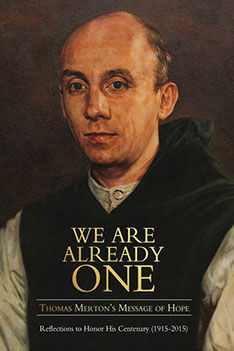“We Are Already One: Thomas Merton’s Message of Hope” is an international collection of personal essays and reads like a community of friends welcoming you in to celebrate Thomas Merton’s centenary year.
Among the birthday party attendees is Franciscan Father Richard Rohr, who writes, “Yes, I believe Thomas Merton was a true prophet, and I use that word in its classic sense as one who sees at a higher level and thus, in effect, foresees.”
Editor Jonathan Montaldo expertly and artfully weaves together essays on Merton the man, his inter-spirituality, his literary life and his social critique. No small task when the subject is a man of paradox: a religious celebrity and hermit, a Trappist monk and cultural critic, a prolific writer, vowed to silence, a monastic yet hugely influential on the outside world, a Catholic priest and student of Buddhism.
Thomas Merton grew to embrace paradoxes.
Perhaps Merton resonates so personally, so directly with those who encounter him today through his writing because it is paradoxical to be Christian in a secular world. The very identity of a Roman Catholic is to embrace the Roman and the Catholic, the secular and the sacred.
Merton, the social critic, “saw the self as having been hijacked by a consumerist society on the one hand and a tendency to politicize everything else on the other.” Advertising, technobabble and politicization all draw us away from silence in the eyes of God.
Decay in communication is what Merton describes as his motivation for speaking out, or rather, writing. In “Seeds of Destruction,” he writes that “genuine communication is becoming more and more difficult and when speech is in danger of perishing or being perverted in the amplified noise of beasts, perhaps it becomes obligatory for a monk to try to speak.”
What is communication without dialog?
Prophetically his advice resonates all the more today. Distraction lurks in the palm of the hand. This hectic pace threatens family life as well.
Merton’s warning precedes smartphones interrupting family meals and intruding upon quiet walks in the park. In his essay, Xavier University Professor of Theology Chris Pramuk describes his household in the back-to-school rush “slogging through math pages with grumpy-hungry kids, tending to the pot on the stove and a cantankerous 4-year-old.”
When Pramuk’s wife asks where dad is, the child answers that he’s fallen asleep, drooling, under the table, head resting on his gradebook. To which his wife responds, “Somebody kick him and tell him to put Henry to bed.”
Busyness besieges breaking bread as a family. The meaningful present is lost.
Merton explains a breakdown of meaning in the literary arts in “Conjectures of a Guilty Bystander.” English professor Lynne R. Szabo, summarizes: “In the postmodern contexts of the late 20th century, a host of literary critics came to accept, as almost de rigeur, hermeneutics for reading literature which are best engaged by strategies of irony and infinite deferrals of meaning.”
A deferral of meaning begets meaninglessness. Countering this trend, Merton advocates for meaning in the arts, family, communication and every aspect of life. Apostate friendships, he emphasizes, are crucial to the cure.
Where most see difference, Merton sees fundamental unity. He held to the tenants of his faith while also allowing himself to delve into Hinduism, Buddhism and other faiths. Even when confronted with ideas from atheism he was able to see the soul’s thirst for God.
Merton’s embrace of paradox guides the reader and the essayists alike to awaken again and again to all things being possible with God. Paradox, after all, is at the heart of one of the greatest mysteries of the Catholic faith. In Christ are humanity and divinity met and joined: He is true God and true man.
Meditating on the mysteries is an ongoing process. Embracing paradox “stretches the mind and opens the heart to something new.” On Merton’s own spiritual journey he had to leave the world and enter the monastery in order to find it.
Merton tells us that “what we have to be is what we are.” He explains that to seek God is to seek our truest self, who God created us to be uniquely and exclusively.
“We Are Already One” helps the Merton experts and newcomers alike to do just that.
This collection creates an ongoing birthday party for the spiritual sojourner and invites you to gather under the sun with Trappists, painters, poets, scholars, Quakers, Catholics, Protestants, Jews and Hindus. Listen to musicians drum bongos and sip ale or, for the ascetics among us, water.

